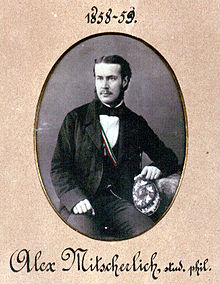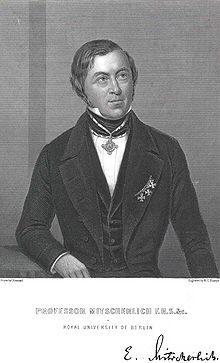Alexander Mitscherlich (chemist)
Alexander Mitscherlich (born May 28, 1836 in Berlin , † May 31, 1918 in Oberstdorf ) was a German chemist and entrepreneur. He is considered to be one of the inventors of the sulphite process , which enabled better and cheaper production of pulp from wood.
Life
education
Alexander Mitscherlich was born in Berlin in 1836 as the youngest child of the then famous chemist Eilhard Mitscherlich . Well-known scientists like Alexander von Humboldt , who even became Alexander's godfather, frequented the house where he was born in Dorotheenstrasse . Already during his school days at the Friedrich-Wilhelms-Gymnasium and the Köllnisches Realgymnasium he showed an interest in chemistry and experimented in his father's laboratory. In his youth he made his first trips abroad, for example to Paris.
In the winter semester of 1857/1858 Mitscherlich began studying, initially at the University of Göttingen , where he joined the Hannovera fraternity a year later . Because his father did not want him to be influenced by other chemists, he studied medicine in Göttingen and returned to Berlin after the semester at the instigation of his father. At the Friedrich-Wilhelms-Universität he mainly studied chemistry with Eilhard Mitscherlich, but also attended lectures by professors such as Gustav Rose (mineralogy), Ernst Eduard Kummer (mathematics), Heinrich Wilhelm Dove and Heinrich Gustav Magnus (physics). In 1861 he completed his studies with a doctorate on the minerals alum stone and loewigite .
In 1862 he became assistant to the chemist Friedrich Wöhler in Göttingen, before he stayed for some time in London and Cambridge and worked for Adolphe Wurtz in Paris . When he found out that his father was seriously ill, he went back to Berlin in the spring of 1863 and represented him in his lectures. After his habilitation in spectral analysis and his father's death in August, Mitscherlich became a private lecturer in experimental chemistry at the Berlin University. In 1867 he was one of the founders of the German Chemical Society . In 1868 he was finally appointed to a professorship for inorganic sciences at the newly founded Forest Academy in Hannoversch Münden .
Mitscherlich gave lectures on chemistry, physics and geology in Münden. He had his own laboratory and an assistant and was initially satisfied with his position. When the Franco-Prussian War broke out, Mitscherlich became a soldier in August 1870. He fought as a sergeant and officer in various French villages until March 1871. On the return trip he met Wilhelmine Höpker, whom he married shortly afterwards. Alexander Mitscherlich is the father of the political scientist Waldemar Mitscherlich and the grandfather of the psychoanalyst Alexander Mitscherlich .
Sulphite pulp process
Soon afterwards his brother Oskar approached him. He planned to build a pulp mill. Until then, wood for paper production was mostly processed with caustic soda . This made it possible to separate the cellulose fibers that are needed for paper production from other substances present in the wood. Mitscherlich, who immediately examined the process in his laboratory, found out, however, that the plant fibers were damaged in the process. In his search for a new means of extracting the pulp, he finally came across sulphurous lime . This material was gentle on the fibers and was easier to obtain than baking soda. In addition, he gained products from the new process as waste that he wanted to use for tanning or to prevent fermentation and putrefaction processes.
In 1874 Mitscherlich's brother had the invention patented in Luxembourg and England - there was no German patent office at the time - and soon afterwards Alexander was able to receive the first paper produced using his new process. The researcher has now worked out a meticulous system to enable the sulfite pulp process to be used on a larger scale. He found cheap and practicable ways to produce the sulphurous cooking liquor and to protect the cellulose fibers after cooking. These working steps for pulp production later became Mitscherlich's actual capital.
Finally, the time was ripe for his own factory, which Mitscherlich had been building in Hannoversch Münden since 1877. But after a short time he got into trouble. The responsible ministry for agriculture, domains and forestry asked him in 1881 to sell the factory, since owning a factory was incompatible with Mitscherlich's position as a professor and his factory was also causing damage to the surrounding forest. Mitscherlich protested, whereupon the instruction was initially suspended for an indefinite period. But now he had problems with Bernard Borggreve , the new director of the forest academy, whom he had probably made an enemy through various provocations. Borggreve wanted to use invective at the ministry to get Mitscherlich to sell the factory or leave the forestry academy. In 1883 Mitscherlich finally gave in, sold the factory, gave up his position at the Forestry Academy and went to Freiburg im Breisgau as a private scholar . The factory he founded continued to successfully produce pulp and remained in operation until 1951.
The new method did not go unnoticed by experts. The purchase of the process, which had already been developed in detail, promised high profits. Mitscherlich was able to sell his new process to a competitor as early as 1879, and contracts with other interested parties followed. The new method spread in Germany, Europe and shortly afterwards in North America. In 1894, around one million quintals of cellulose were already being produced there using the Mitscherlich method.
In 1883, however, Mitscherlich ran into serious problems: after a complaint by some industrialists, a court declared parts of his imperial patent 4179 invalid because it was discovered that the American Benjamin Tilghman had patented a sulphite process for processing pulp as early as 1866/67. Mitscherlich appealed. He insisted - not only for economic reasons - that not only had he invented the process independently of Tilghman, but also that he had been the first to put it on an industrially usable framework. However, the Imperial Court upheld the decision in 1884. Other pioneers of the process were Carl Daniel Ekman in Sweden and Karl Kellner .
This had serious consequences for the researcher. The buyers questioned the contracts concluded with Mitscherlich and in some cases stopped paying the agreed sums, arguing that they had paid for a patent that was no longer valid. Mitscherlich took legal action against it. He led almost 30 lawsuits until in 1897 he reached a settlement with at least some of the companies involved. In order to compensate for the losses, Mitscherlich founded a factory in Hof an der Saale in 1893 , in which he mainly produced glue.
In 1890 he had a representative villa built in the park on the Sternwaldeck in Freiburg-Wiehre , which has served as a studio for visual artists since 1979 . In the summer semester of 1892 he became an honorary member of the Franconia Freiburg fraternity . The city of Hann. In 1936, Münden named the street on which his laboratory was located after him. After his former laboratory building had to give way to the Grotefend-Gymnasium Münden in 1968 , a memorial stone was erected in 1980.
Varia
In 1936, on the occasion of Alexander Mitscherlich's hundredth birthday, Zellcheming donated the Alexander Mitscherlich medal to honor outstanding achievements in the field of cellulose research. The first prize winner was Walter Brecht , the long-time director of the Darmstadt Institute for Paper Manufacture.
swell
- Max Krieg: Alexander Mitscherlich. A picture of life . CA Wagner, Freiburg im Breisgau 1918 (biography from the Mitscherlich area).
- Karl Hasel (Hrsg.): Sources for the history of the forest faculty of the Georg-August-Universität Göttingen . 1968, pp. 152–172 (correspondence especially on the task of the professorship at the forest academy).
- Alexander Mitscherlich: biography of Alexander Mitscherlich . January 1887. Curriculum vitae from a letter to Georg Krause . Deutsches Museum , Munich, HS No. 07692 ( online edition at Wikisource ).
literature
- Sören Brandes: The revolution in paper. Alexander Mitscherlich (1836–1918) . In: Daniel Klink, Martin Mahn, Alexander Schug (eds.): Humboldt's innovations. Social, scientific and economic entrepreneurship at the Humboldt University in Berlin . Past Publishing House, Berlin 2010, ISBN 978-3-940621-16-0 , pp. 107-114 (popular science; available from Google Books ).
- Frieder Schmidt: Mitscherlich, Alexander. In: New German Biography (NDB). Volume 17, Duncker & Humblot, Berlin 1994, ISBN 3-428-00198-2 , p. 570 f. ( Digitized version ).
- Frieder Schmidt: Tilghman, Mitscherlich and the case of the imperial patent 4179 . In: The paper. 47, 1993, pp. 192-199.
- Alexander Mitscherlich . In: From the forest. Messages from the Lower Saxony state forest administration . Issue 51: Frank Kropp, Zoltán Rozsnyay: Lower Saxony Forest Biography. A source volume . Wolfenbüttel 1998, pp. 337-339.
Web links
Remarks
- ↑ Meeting of June 10, 1918 . In: Reports of the German Chemical Society . Volume 51, January – June 1918, 1030–1035 doi : 10.1002 / cber.191805101126
- ^ Henning Tegtmeyer : Directory of members of the fraternity of Hannovera Göttingen, 1848–1998 , Düsseldorf 1998, page 33
- ↑ Krieg, Alexander Mitscherlich, p. 13.
- ↑ Constituent Assembly . In: Ber. German chem. Ges. 1868 ( digitized on Gallica )
- ↑ A detailed description of Mitscherlich's actions and stations in France (based on his war diary) during the war, Alexander Mitscherlich, pp. 31–46.
- ↑ See decree of the Ministry of Agriculture, Domains and Forests of September 29, 1881 to Professor Mitscherlich, in: Hasel (Ed.), Sources for the History of the Forest Faculty, No. 137, p. 154.
- ↑ See the letters from Hasel (ed.), Sources for the History of the Forest Faculty, No. 139–146, pp. 155–167, in particular Borggreves report to the Ministry: No. 139, pp. 155–164.
- ↑ Krieg, Alexander Mitscherlich, p. 65.
- ↑ On this R. Schall, The processes of Professor Alexander Mitscherlich against the buyer of his cellulose process, 1892.
- ↑ Antje Lechleiter: Wide awake in the idyll. Badische Zeitung, October 18, 2019, accessed on October 18, 2019 .
- ^ Association of Pulp and Paper Chemists and Engineers: Zellcheming, Annual Report 2011 , pp. 122–124.
- ↑ Professor Dr. Walter Brecht on his 60th birthday, in: Wochenblatt für Papierfabrikation 13 (1960), p. 551.
| personal data | |
|---|---|
| SURNAME | Mitscherlich, Alexander |
| BRIEF DESCRIPTION | German chemist |
| DATE OF BIRTH | May 28, 1836 |
| PLACE OF BIRTH | Berlin |
| DATE OF DEATH | May 31, 1918 |
| Place of death | Oberstdorf |


